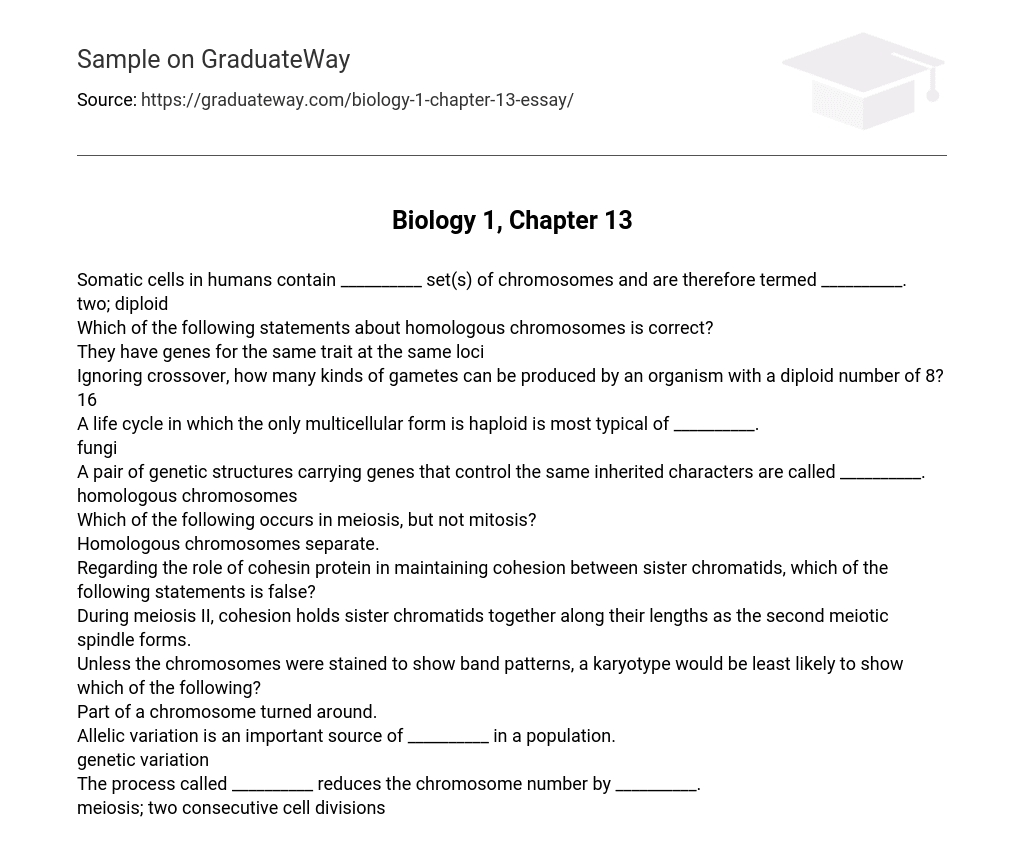Somatic cells in humans contain __________ set(s) of chromosomes and are therefore termed __________.
two; diploid
Which of the following statements about homologous chromosomes is correct?
They have genes for the same trait at the same loci
This essay could be plagiarized. Get your custom essay
“Dirty Pretty Things” Acts of Desperation: The State of Being Desperate
writers
ready to help you now
Get original paper
Without paying upfront
Ignoring crossover, how many kinds of gametes can be produced by an organism with a diploid number of 8?
16
A life cycle in which the only multicellular form is haploid is most typical of __________.
fungi
A pair of genetic structures carrying genes that control the same inherited characters are called __________.
homologous chromosomes
Which of the following occurs in meiosis, but not mitosis?
Homologous chromosomes separate.
Regarding the role of cohesin protein in maintaining cohesion between sister chromatids, which of the following statements is false?
During meiosis II, cohesion holds sister chromatids together along their lengths as the second meiotic spindle forms.
Unless the chromosomes were stained to show band patterns, a karyotype would be least likely to show which of the following?
Part of a chromosome turned around.
Allelic variation is an important source of __________ in a population.
genetic variation
The process called __________ reduces the chromosome number by __________.
meiosis; two consecutive cell divisions
Characteristic of the bdelloid rotifer is that it __________.
is an example of an animal that has not reproduced sexually in 40 million years
__________ are a group of genetically identical individuals produced by a process called __________.
Clones; asexual reproduction
The life cycle called __________ in plants has two multicellular stages: the __________ and the __________.
alternation of generations; haploid gametophyte; diploid sporophyte
What is the result when a diploid cell undergoes meiosis?
Four haploid cells
Which of the following is a function of mitosis in humans?
Multiplication of body cells
Somatic cells in humans differs from gametes in that human somatic cells __________.
contain two sets of each of the 23 chromosome types
The zipper-like complex that forms in meiosis occurs during __________ and is called the __________.
prophase I; synaptonemal complex
A clone is the product of __________.
asexual reproduction and mitosis
Which life cycle stage is found in plants but not animals?
Multicellular haploid
At the end of mitosis, __________ daughter cells that are genetically __________ are formed, while at the end of meiosis, __________ daughter cells that are genetically __________ are formed.
two; identical; four; distinct
The egg (ovum) of a rabbit contains 22 chromosomes. How many chromosomes are in the somatic (body) cells of a rabbit?
44
Sister chromatids differ from nonsister chromatids in that sister chromatids __________.
are products of the S phase of the cell cycle and are two copies of one chromosome
How many genes are present in the human genome?
Tens of thousands
Regardless of whether an organism is an animal, a plant, a fungus, or an algal cell, all zygotes are __________ and are formed during the __________ of two __________ gametes.
diploid; fertilization; haploid
What is a locus?
The precise location of a gene on a chromosome.
Somatic cells in animals differ from gametes in that somatic cells __________.
are all of the cells of the body except for the gametes and their precursors
Genetic diversity requires __________.
sexual reproduction, independent assortment, crossing over between nonsister chromatids of homologous chromosomes, and random fertilization
Darwin realized the importance of heritable variation to evolution __________.
even though he never read any of Gregor Mendel’s work
In meiosis, __________ of __________ cross over and form __________.
nonsister chromatids; homologous pairs; chiasmata
The major contribution of sex to evolution is that __________.
it provides a method to increase genetic variation
Independent assortment of chromosomes is a result of _____.
the random way each pair of homologous chromosomes lines up at the metaphase plate during meiosis I
How are sister chromatids and homologous chromosomes different from each other?
Homologous chromosomes contain the same gene loci but may have different alleles of a particular gene. Sister chromatids are identical copies of each other produced during DNA replication.
Centromeres split and sister chromatids migrate to opposite poles in meiosis _____.
anaphase II
Homologous pairs of chromosomes align opposite of each other at the equator of a cell during _____.
meiosis metaphase I
Which diagram represents anaphase I of meiosis? #5
I
How is natural selection related to sexual reproduction as opposed to asexual reproduction?
Sexual reproduction results in many new gene combinations, some of which will lead to differential reproduction.
What is a major difference between mitosis and meiosis I in a diploid organism?
Sister chromatids separate in mitosis, while homologous pairs of chromosomes separate in meiosis I.
What is crossing over?
the exchange of homologous portions of nonsister chromatids
Which of the following happens at the conclusion of meiosis I?
Homologous chromosomes of a pair are separated from each other.
Crossing over normally takes place during which of the following processes?
meiosis I
Remember! This essay was written by a student
You can get a custom paper by one of our expert writers
Order custom paper
Without paying upfront

